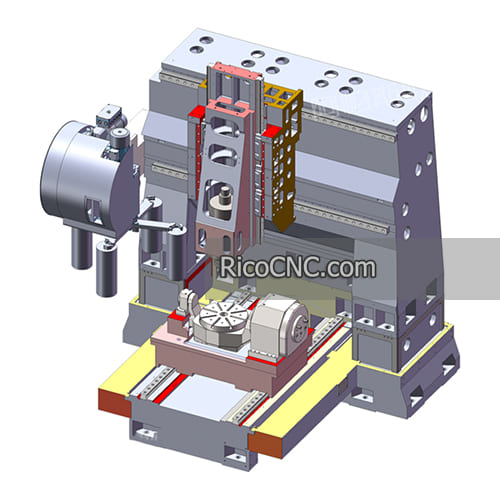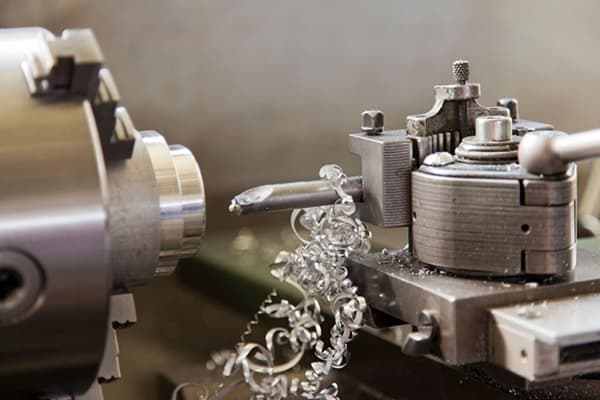
In modern manufacturing industry, vertical machining center (VMC) as the core equipment for high-precision machining, its stable operation directly affects production efficiency and product quality. However, long-term high load work or lack of standardized maintenance, may lead to equipment performance decline, frequent failures, and even cause unexpected downtime, resulting in economic losses. In order to help enterprises reduce maintenance costs, extend equipment life, this paper system combing vertical machining centers common 12 maintenance projects, for routine maintenance to provide practical reference.
Item 1: Coordinate axis system
Core components: X/Y/Z axis screw, guideway, shield, base, column
As the “skeleton” of the machine movement, the accuracy of the coordinate axis system directly determines the machining quality. As the “backbone” of the machine movement, the accuracy of the coordinate axis system directly determines the machining quality. Daily attention should be paid to the lubrication status of the screw bearings, the wear and tear of the guideway's plasticized layer, and the sealing of the telescopic shield.
Item 2: Spindle System
Core Components: Spindle Bearings, Tool Puller Mechanism, Pulleys, Oil Cooler
Common spindle problems include overheated bearings, abnormal tool changes, and belt slippage. Regularly checking the spindle taper hole cleanliness, oil cooler circulation efficiency, can avoid 80% of the spindle sudden failure.
Item 3: Lubrication System
Core Components: Lubrication Pump, Oil Distributor, Oil Pipe
Insufficient lubrication will lead to dry wear of the guide rail and damage to the screw. Maintenance focuses on ensuring that the oil line is smooth, the distributor works properly, and the cleanliness of the lubricant.
Item 4: Pneumatic system
Core components: pneumatic triplex, solenoid valve, cylinder
Air leakage from aging air lines and clogging of triplex cartridges are common sources of failure. Maintenance should regularly discharge the water in the air storage tank, check the elasticity of the cylinder sealing ring, and ensure that the air pressure is stabilized within the range of 0.4-0.6MPa.
Item 5: CNC system
Core components: CNC panel, servo drive, handwheel
Daily need to guard against the failure of the operating panel keys, servo motor overload alarm and other problems. It is recommended to regularly backup system parameters to avoid data loss leading to downtime!
Item 6: Low-voltage Electrical System
Core Components: Cables, Alarm Lights, Cabinet Cooler
Loose cable glands and poor heat dissipation in the cabinet may cause short circuits or component burns. Focus on checking whether the external cable sheath is damaged, whether the cabinet cooling fan can effectively cool down the temperature, and recommend upgrading the high-brightness LED lighting to enhance safety during night operation.
Item 7: Cooling System
Core Components: Cooling Pump, Filter, Cooling Tank
Poor circulation of cutting fluid will lead to overheating of the tool and deformation of the workpiece. Maintenance needs to clean up the iron chips and oil deposited in the water tank and replace the filter regularly.
Item 8: Chip removal system
Core components: chip conveyor chain plate, screw rod, drive motor
The accumulation of chips may scratch the guide rail or even cause fire. Chain plate breakage and motor overload are typical failures. Maintenance requires adjusting the clearance between the chip conveyor and the machine base plate, and the spiral chip conveyor is recommended to be disassembled and cleaned of internal tangles every quarter.

Item 9: Hydraulic System
Core Components: Hydraulic Pump, Control Valve, Oil Filter
Unstable pressure in the hydraulic system can lead to tool change failure or fixture loosening. Focus on the cleanliness of the oil (NAS grade 8 or below is recommended) and replace the filter element regularly. If the oil temperature rises abnormally, check the pump body for wear or valve leakage.
Item 10: Tool magazine system
Core components: robot, tool holder, proximity switches
Tool magazine jamming and shifting of the tool change position are high-frequency failures. During maintenance, it is necessary to clean the positioning surface of the tool set, check the clamping strength of the manipulator, and calibrate the sensing distance of the proximity switch every six months to ensure the smooth and accurate tool changing action.
Item 11: Protective Systems
Core Components: Machine Hood, Sliding Door Rollers, Viewing Window
Damage to the protective systems can result in chip splashing or coolant leakage. Maintain sliding door lubrication, blast glass integrity, and periodically repair rusted paint.
Item 12: precision calibration
Core indicators: geometric accuracy, positioning accuracy, repeat positioning accuracy
Precision decline is a visual manifestation of equipment aging. It is recommended to carry out laser interferometer testing at least once a year. By compensating the backlash of the screw and adjusting the parallelism of the guide rail, the machining accuracy can be restored to more than 90% of the factory standard.
Systematic maintenance not only reduces unplanned downtime by more than 70%, but also extends the life of the equipment by 3-5 years. For the selection of maintenance parts, it is recommended to prioritize the use of original specification products to ensure that the dimensional accuracy and material properties are matched, Rico as a one-stop machine tool parts supplier, can provide original brand parts and cost-effective replacement parts.
Tel:+86-51268235075
Fax :+86-51268235075
Mobile:+86-13390848665
E-mail: cncsale@ricocnc.com
Skype: ccsalce
Whatsapp: +86-13390848665


